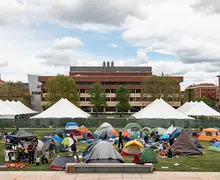Scholarship in Action, a collective responsibility
At some point in our journey through this frozen tundra we call Syracuse, we have to ask ourselves, why do we do it? What in the world possessed us to spring for the snowy hills of Central New York over the sand-washed shores of, say, Miami? For the many students who choose to serve people off the Hill, from the Greeks to the tree huggers with acts of community service, the question becomes even more complex. Why is it that we go above and beyond the mediocre call of duty to put our scholarship into action?
For many black students, like myself, this sense of public service, using what you have to better the community, is engrained in our souls and in our history as a struggling people in this nation. Our ancestors earned degrees, not just to better their own lots, but to benefit the people they’d left at home and others like them, whose life journey did not permit them the chance to study at institutions of higher learning.
It outrages me that a great deal of young Americans, particularly black Americans, do not collectively understand the value of community service. In a survey of approximately 1,100 colleges and universities, African-American students made up only 10 percent of those involved in community service, according to Campus Connect, a college coalition for civic engagement. I am not na’ve enough to ignore the fact that this statistic represents the overall lack of black students enrolled in college. However, this number also shows the ugly truth that only a remnant, a faithful few, have kept the commitment to common good in their hearts. Others have adopted an incredibly individualistic view of life, drastically different from that of past black leaders.
‘I don’t know anything about the people in this community,’ said an African-American sophomore, David Cowans. ‘You’re not responsible for helping the people in Syracuse, just because you come here. That’s more of a civic duty than a personal duty.’
It is this type of attitude that, according to Oprah Winfrey, ultimately leaves a person feeling empty. In a Feb. 3 interview on BET’s ‘Meet the Faith’ the queen of philanthropy explained community service is an essential part of a rewarding human experience. ‘You are not a fulfilled person until you have found a way to give back what you have been given,’ Winfrey said.
In Black History Month, it behooves us to take notes from the strong blacks who have left behind awe-inspiring legacies of public service and join the ranks of students continuing in this service to ensure our future is better than our past.
Each student must define what scholarship in action means to him or her and shape a college experience that fully incorporates the element of giving back. If the obvious poverty in the city of Syracuse is not enough to inspire you, then for goodness sake, do it because Oprah said so.
Timeka Williams is a sophomore magazine journalism and international relations major. Her columns appear every other Thursday. She can be reached at [email protected].
Published on February 6, 2008 at 12:00 pm




